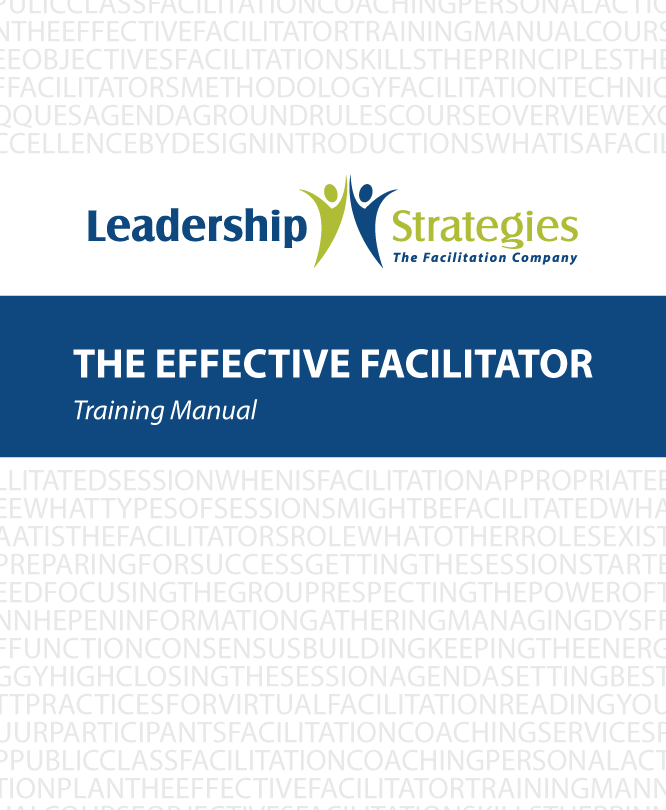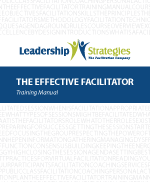The Effective Facilitator Workbook – 250 pgs
$350.00
Description
The Effective Facilitator is the Leadership Strategies highly-acclaimed course for both beginning and veteran facilitators. The course is based on the Ten Principles of Facilitation and includes over 90 specific techniques for success. The Principles provide a highly structured framework for guiding the facilitator, from preparing for a successful session, through achieving buy-in and commitment, to session wrap up and close.
Preparing for Success – Cover all the bases
What are the ten bases to cover in preparation?
With whom do you talk? What do you ask?
What do you do with what you hear?
Getting the Session Started – Inform, excite, involve, empower
What are the four keys for starting the session?
How do you get the group excited and motivated?
Focusing the Group – Establish the course; avoid detours
How do you get the group focused immediately?
How do you avoid the question/silence pitfall?
How do you keep them on track and interacting?
The Power of the Pen – Use it, don’t abuse it, make it theirs
What are the seven deadly sins of facilitation?
How do you avoid abusing the power of the pen?
Information Gathering – Know your tools and how to use them
What are the eight questioning techniques?
How do you use verbal pictures for better answers?
When do you use listing, brainstorming, grouping, etc. ?
Dysfunctional Behavior – Conscious Prevention, Early Detection, Resolution
What are the four steps for responding to dysfunction?
How do you prevent dysfunctional behavior from occurring?
Consensus Building – Create and maintain a consensus-focused process
What are the five ways to drive to consensus?
How do you get the group building consensus from the start?
Keeping the Energy High – Set the pace, anticipate the lulls, react accordingly
What are the strategies for combating the lullaby times?
How do you keep the energy high over an extended session?
Closing The Session – Review, evaluate, close, debrief
What are the four critical activities in closing?
How do you ensure commitment to the decisions made?
How do you identify unresolved issues?
Agenda Setting – Adapt your agenda to address the need
How do you employ the principles to construct detailed agendas for strategic planning,
program design, status reporting, issue resolution, and process reengineering?
The workbook’s depth is in the “”how-to’s””, the 90+ techniques —
It doesn’t just tell you to “”Prepare for the session.”” Instead, it gives you the specific steps of whom to talk with, what to talk about, and what to do with what you hear.
Instead of simply telling you to “”get the session started,”” the workbook details what to say in your opening words, what to do (and not to do) with your voice and body, how to “”warm-up”” the group so you don’t get complete silence when you ask the first question.
Rather than just define consensus, it recommends specific methods for establishing a consensus-focused process from the start of the session, gives you an approach for keeping the group focused on consensus-building, and describes five alternative strategies for resolving disagreements that occur.
It doesn’t just discuss “”open-ended”” and “”close-ended”” questions. The workbook identifies eight different question types and gives you specific methods for probing for clarity, challenging questionable suggestions, and floating ideas that might have been overlooked.
The workbook includes ten facilitator guides (described below) which provide detailed instruction for leading strategic planning, process improvement, data modeling and other sessions.
The result is a structured process which we call the Facilitator’s Methodology.




Reviews
There are no reviews yet.